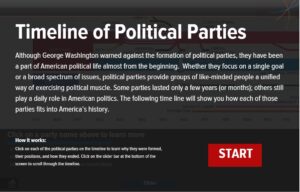Is the Republican Party Headed for a Split?
Political frustration is hardly new. Continually governing an “of the people, by the people, for the people” global superpower based on open-ended principles laid out more than 200 years ago is no easy feat. Still, this election season has the Republican Party fractured in a way it hasn’t been for many years. Prominent members of the GOP—including former candidates Mitt Romney and John McCain, as well as House Speaker Raul Ryan and Senate Leader Mitch McConnell—are lining up to vocally oppose the ongoing political success of Donald Trump.

Click on the banner to visit Election Central–where politics and government are the focus. Credit: McGraw-Hill Education
But before we look at what at the problems in the Republican party right now, let’s examine some other major political splits in the nation’s past.
A Brief History of Our Political Parties
Our first president, George Washington, was not affiliated with a political party and served two terms unopposed. When he stepped down in 1797, two parties emerged—the Federalists and the Anti-Federalists. The Federalists were formed by Alexander Hamilton (whose starring role in a new Broadway musical, we profiled just last month), John Adams (who went on to become our nation’s second president), and Gouverneur Morris (one of the lesser-known Founding Fathers). Thomas Jefferson and James Madison quickly formed the Democratic-Republican Party. The Federalists dissolved by 1815, leaving only one party for nearly a decade.
The Democratic-Republicans eventually became fractured, with a fraction formally calling themselves the National Republican Party. After Andrew Jackson took office as president (in 1829), Democratic-Republicans dropped the latter part of is name, becoming the Democratic Party. From 1832–1853, in an attempt at reform, the National Republicans became the Whig Party. It dissolved, in part, because of divides regarding the issue of slavery. In its wake came the National Union Party in 1854. Abraham Lincoln was the first presidential candidate of the Republican Party in 1869. Ever since, American politics has operated under a two-party system, with occasional Independent Third Parties.
New Divisions?
Traditional Republican interests include limited national government, strong national defense support of free trade, lower taxes openness to immigration, and a traditional definition of “family values.” Although it attempts to appeal to low- and middle-income whites, its economic agenda is often viewed as not including them, focusing instead on deregulation, tax cuts for the wealthy and cuts to entitlement plans.
Ideologically, it is difficult to pin down Trump’s actual political opinions. In the past he has supported abortion, gun control, single-payer health care, and taxes on the wealthy (all counter to traditional Republican ideals). At the same time, his current views on immigration and foreign policy are counter to more in line with the conservative American voters of recent decades.
Many of Trump’s critics say his opinions are simply opportunistic–that he will say whatever he thinks voters want to hear. Trump’s current success as the Republican nominee front runner has many within the GOP in a predicament. As much as some people dislike him, the notion of voting for the Democratic nominee is an equally unappealing prospect.
As a result, there are some Republicans saying that they would break away from the mainstream Republican party rather than accept Donald Trump as the GOP nominee. No well known national Republican politician has taken up the banner of this splinter movement, but there are still some months to go before the Republican national convention which is being held this summer in Cleveland, Ohio. If Trump continues to win primary contests and collect delegates, something dramatic may still occur. How it might help or hurt conservatives who are determined to win back control of the White House is yet a different question.

